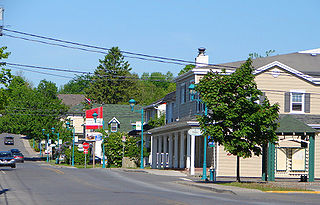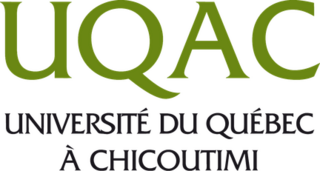Related Research Articles
Education in Quebec is governed by the Ministry of Education and Higher Education. It was administered at the local level by publicly elected French and English school boards, changed in 2020 to school service centres. Teachers are represented by province-wide unions that negotiate province-wide working conditions with local boards and the provincial government of Quebec.
The French language is spoken as a minority language in the United States. Roughly 2.1 million Americans over the age of five reported speaking the language at home in a federal 2010 estimate, making French the fourth most-spoken language in the nation behind English, Spanish, and Chinese.

Franco-Ontarians are Francophone Canadians that reside in the province of Ontario. Most are French Canadians from Ontario. In 2021, according to the Government of Ontario, there were 650,000 Francophones in the province. The majority of Franco-Ontarians in the province reside in Eastern Ontario, Northeastern Ontario, and Central Ontario, although small francophone communities may be found in other regions of the province.
This article presents the current language demographics of the Canadian province of Quebec.

Saint-Lazare is an off-island suburb of Montreal, in southwestern Quebec, Canada in the Regional County Municipality of Vaudreuil-Soulanges.

The Université du Québec à Chicoutimi (UQAC) is a branch of the Université du Québec network founded in 1969 and based in the Chicoutimi borough of Saguenay, Quebec, Canada. UQAC has secondary study centres in La Malbaie, Saint-Félicien, Alma, and Sept-Îles. In 2017, 7500 students were registered and 209 professors worked for the university, making it the fourth largest of the ten Université du Québec branches, after Université du Québec à Montréal (UQAM), Université du Québec à Trois-Rivières (UQTR), and École de technologie supérieure (ETS).
Francization or Francisation, also known as Frenchification, is the expansion of French language use—either through willful adoption or coercion—by more and more social groups who had not before used the language as a common means of expression in daily life. As a linguistic concept, known usually as gallicization, it is the practice of modifying foreign words, names, and phrases to make them easier to spell, pronounce, or understand in French.
The Commission of Inquiry on the Situation of the French Language and Linguistic Rights in Quebec was established under the Union Nationale government of Jean-Jacques Bertrand on December 9, 1968.

French immersion is a form of bilingual education in which students who do not speak French as a first language will receive instruction in French. In most French-immersion schools, students will learn to speak French and learn most subjects such as history, music, geography, art, physical education and science in French.

Pierrefonds-Roxboro is a borough of the city of Montreal. It was created January 1, 2006, following the demerger of parts of the city.
Canadian French is the French language as it is spoken in Canada. It includes multiple varieties, the most prominent of which is Québécois. Formerly Canadian French referred solely to Quebec French and the closely related varieties of Ontario (Franco-Ontarian) and Western Canada—in contrast with Acadian French, which is spoken by Acadians in New Brunswick and some areas of Nova Scotia, Prince Edward Island and Newfoundland & Labrador.
Magoua is a particular dialect of basilectal Quebec French spoken in the Trois-Rivières area, between Trois-Rivières and Maskinongé. Long before a military fort was constructed there, Trois-Rivières became in 1615 the first stronghold of the coureurs des bois outside the city of Québec. Magoua is the ethnonym applied to their descendants in the area. Magoua is the most conservative of all Quebec French varieties, including Joual. It preserves the sontaient ("étaient") characteristic of Métis French and Cajun French, has a creole-like past tense particle tà and has old present-tense contraction of a former verb "to be" that behave in the same manner as subject clitics.
Charles Castonguay is a retired associate professor of Mathematics and Statistics at the University of Ottawa.
The Language Instruction for Newcomers to Canada program is a free language education programme—funded and regulated by the Canadian government's Department of Immigration, Refugees and Citizenship—that offers full-time and part-time English- and French-language lessons to adult permanent residents and Convention refugees.
The First Congress on the French Language in Canada was held in Quebec City from June 24 to June 30, 1912. Its stated objective was to "examine the questions raised by the defence, the culture and the development of the French language and literature in Canada."
Cégep de Trois-Rivières is a French-language College of general and vocational education (CEGEP) in Trois-Rivières, Quebec, Canada. It is located at 3500 rue De Courval. It was established in 1968.
Merrill Swain is a Canadian applied linguist whose research has focused on second language acquisition (SLA). Some of her most notable contributions to SLA research include the Output Hypothesis and her research related to immersion education. Swain is a Professor Emerita at the Ontario Institute for Studies in Education (OISE) at the University of Toronto. Swain is also known for her work with Michael Canale on communicative competence. Swain was the president of the American Association for Applied Linguistics in 1998. She received her PhD in psychology at the University of California. Swain has co-supervised 64 PhD students.

The Official Languages and Bilingualism Institute (OLBI) is a language institution affiliated with the University of Ottawa, in Ottawa, Canada. Its mission is to promote excellence and innovation in the fields of bilingualism and language acquisition, thus helping the University fulfill its role to "further bilingualism and biculturalism and preserve and develop French culture in Ontario."
The Sturgeon Falls Education Crisis was a 1971 language-rights conflict in Ontario centered on the provision of French-language education for the Franco-Ontarian community in Sturgeon Falls, Northern Ontario.
Léandre Bergeron is a Québécois writer, historian, linguist, and cartoonist.
References
- ↑ Hayday, 144
- ↑ "Home". myexplore.ca.
- ↑ "Home". destinationclic.ca.
- ↑ "Home". myodyssey.ca.
- ↑ "Accreditation | AQEFLE - AQEFLE". aqefle.com. Archived from the original on 2016-04-11.
- ↑ "École de français de Trois-Pistoles - AQEFLE". aqefle.com. Archived from the original on 2016-04-12.
Hayday, Mathew. So they want us to learn French: Promoting and Opposing Bilingualism in English-Speaking Canada. UBC Press. 2015.